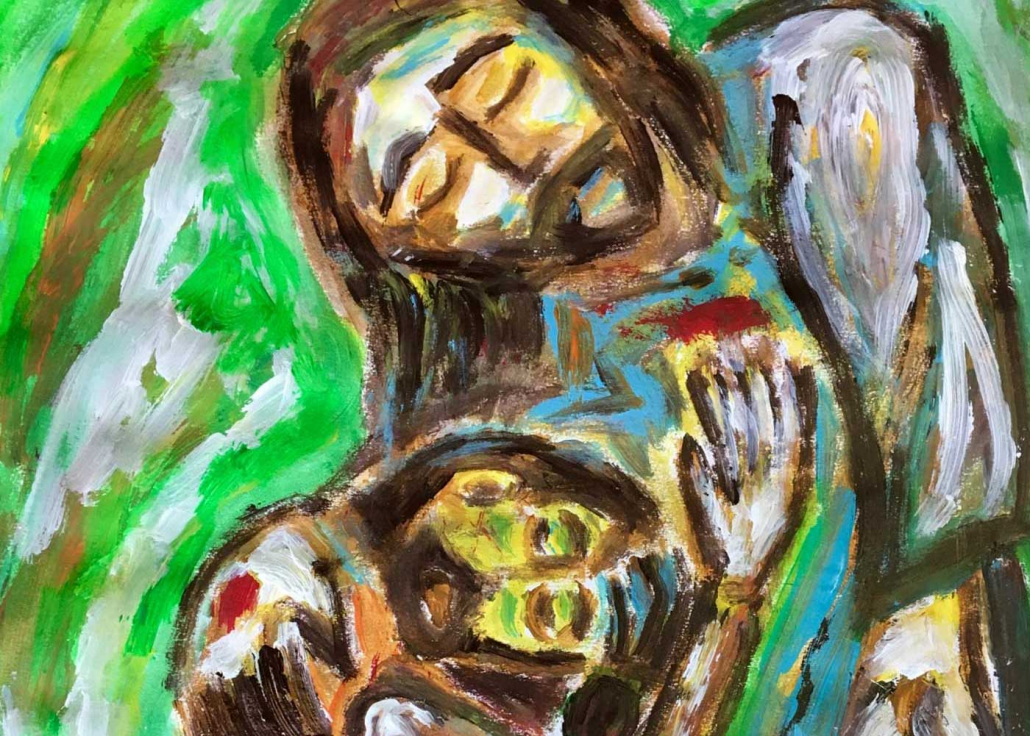Image (detail): ‘Jesus and Thomas’, by Ronald Raab CSC.
‘To touch and be touched’
Andrew Collis
Easter 2, Year C
John 20:19-31
“To touch and be touched simultaneously is to be connected with others in a way that prises us open” (Richard Kearney).
Today’s homily might simply repeat this line, over and over. Perhaps in light of this painting (painted with a cloth) by artist Ronald Raab CSC (Congregation of Holy Cross). Note the tiny space between the fingers of Thomas and the wound of Jesus. An intimate/healing space – as though the Spirit herself conducted the believing …
The homily, however, revisits our gospel for Easter Day (Luke 24:1-12) – Mary of Magdala, Joanna, Mary the mother of James, two figures in dazzling garments, disbelieving apostles, Peter running, stooping, looking – in light of the Easter Icon, on this Easter Day for Orthodox believers in Ukraine, in Russia, in Australia and throughout the world …
The Easter gospel traces a movement of faith from loving kindness to emptiness, encounter with strangers/angels, then memory, testimony, disbelief, action, wonder/amazement … Faith after faith, we might say.
More like a spiral than a circle, loving kindness moves outward, leads to wonder/amazement – having encountered strangers/angels, having passed through memory (in touch with real feeling), testimony, disbelief, then to action. Do something! Act now!
Wonder/amazement follows.
This is one way we might read for wisdom – discerning the shape of a story. Then noticing similar shapes in our own stories, in our own lives …
Loving kindness toward anyone seeking inclusion in social or sporting activity … seeking asylum, freedom, home or habitat … demanding action for climate justice … action for peace in memory of millions … theological reflection (critical reflection on idols of power, control, money) … small acts of mercy … the miracle of life, an outstretched hand, eyes that smile …
I’ve tried to say something about resurrection as return to the world, by way of ethical action – hospitality to strangers, commitment to the art of welcome, nourishment, care. Theology is first and foremost about ethics – “God is love” – Easter faith draws us back into the world, to live and love with others.
“Ethics first” also means beware religion (onto-theology) promoting authentic existence over loving kindness, authentic existence over peace with justice, whether emphasis is put on being Christian, being German (or Aryan), being Russian, being Australian …
I might have invited us to look upon, to read the Orthodox Icon (10th century), which teaches the (inner/bigger) meaning of Easter – the shape of the Easter story. What do we see? What ethic is shown?
Note that Christ, the Holy Stranger, takes Adam and Eve (you, me) by the hand – touch, tact, connection, liberation, reconciliation …
Have you experienced the loving touch of Christ? Have you experienced the healing touch of a Holy Stranger (human or otherkind)? Have you experienced (the call to) liberation or reconciliation (genuine conversation, for example, rather than exchange of slogans or insults)? What might you say about it?
Conversely (see John 20:19-31), have you ever considered ministry/care in terms of tending the wounded body of Christ?
Note that the saints (on the right), attend to what is happening – note their faces, gestures …
When have you witnessed the “harrowing of hell”? When have you witnessed new life? What difference did that make to your understanding of the world? To your sense of being with others in the world? What might you say about that?
Note, in the Icon, that past, present and future seem to co-exist (Miriam notes a consonance with Indigenous spirituality). The prophets and rulers of Israel (on the left) see the coming of Christ, the joy of God’s people – many generations …
Where do you hear prophetic words, the promise of joy (at what point or depth of story)? Where do you hear the call to repentance/change? How might we prepare the way for Christ’s coming (again) – the “ana-carnation” of Christ in holy strangers, opportunities, projects, politics?
Today I recognise a call to reconciliation … faithful witness … prophetic words/action in the work of Médecins Sans Frontières – Doctors Without Borders responding to dire need.
In Ukraine, the healthcare system has been disrupted by war and the impact is felt in supply chains. Some medicines are starting to run short and it is not possible to order them through the usual channels. In addition to the direct consequences of the war, the impact for patients suffering from chronic diseases – cancer or diabetes, for example – is likely to be disastrous.
With our support, the work will continue.
“To touch and be touched simultaneously is to be connected with others in a way that prises us open.” Amen.




